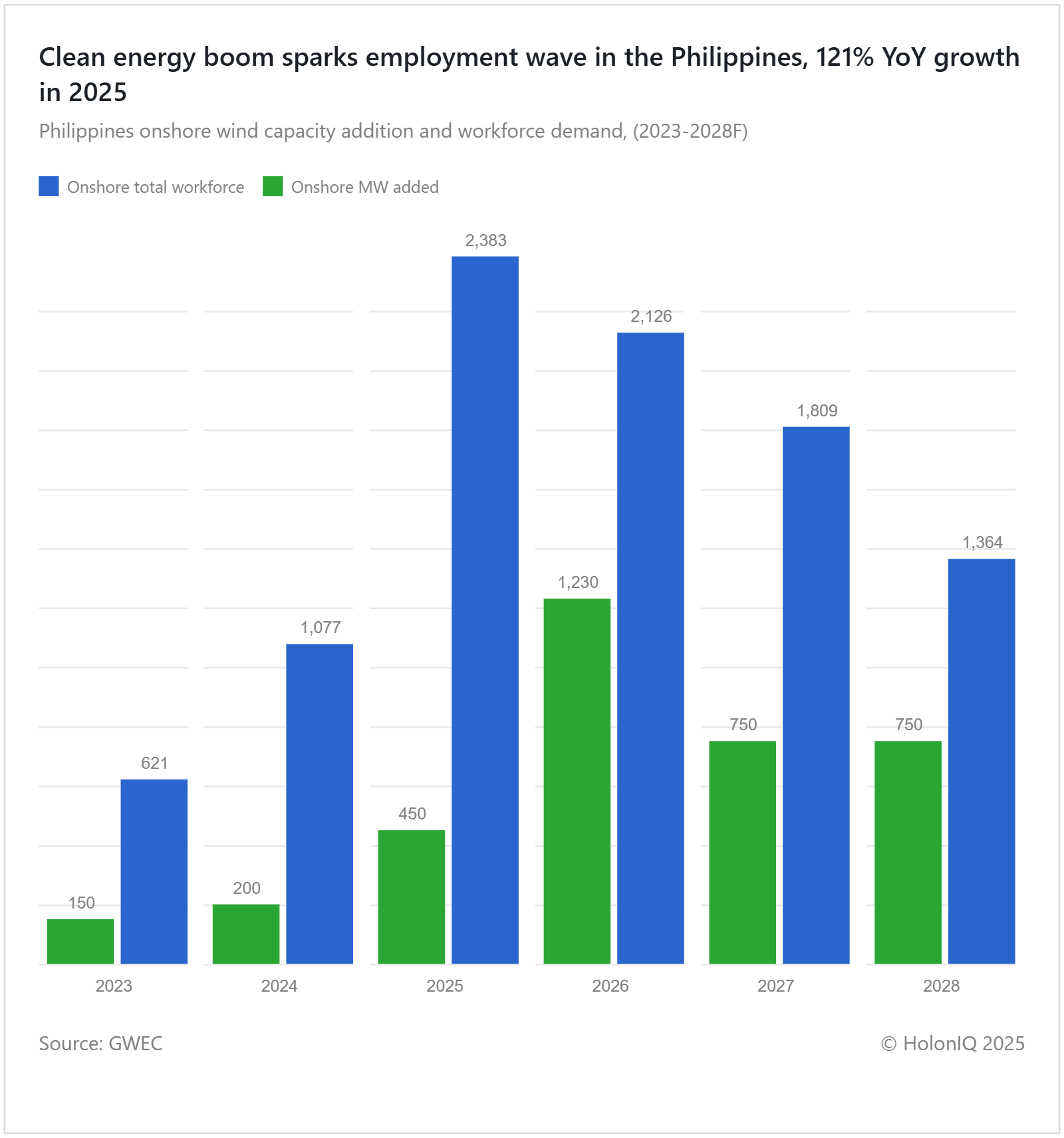🌎 Green Skills #23
HolonIQ is tracking reskilling and upskilling efforts as technology, decarbonization, and global dynamics reshape energy, environment, infrastructure, and mobility sectors. Targeted workforce development is key to enhancing skills, driving growth, and supporting sustainable progress.

The race to decarbonize continues, but workforce gaps threaten to derail clean energy goals in key regions. In the Philippines, the renewable energy sector could require up to 350,000 new workers by 2030, driven by rapid expansion in wind, solar, and grid infrastructure. Onshore wind, in particular, is scaling quickly, with workforce demand set to quadruple by 2025 and peak in 2026 alongside record capacity additions. Despite slowing slightly after 2026, labor needs remain high through 2028, pointing to persistent skills shortages. Urgent investment in wind-specific training, education alignment, and workforce roadmaps will be critical to close the talent gap and meet national energy targets.
Across Asia and the Caribbean, upskilling efforts are gaining momentum. Tata Power launched a Green Energy Skilling Centre in Delhi to strengthen India’s clean energy workforce, while St Kitts & Nevis introduced solar PV training to boost local energy capacity and job creation. Meanwhile, the EU’s zero-emission car target for 2035 is expected to preserve up to 1 million green jobs, aligning industrial and climate goals.
Thanks for reading!
Not a subscriber yet?
Green Labor Market Trends
💡 Philippines May Need 350,000 More RE Workers by 2030. Projections indicate the Philippines could require an additional 350,000 renewable‑energy sector employees by 2030. A looming labor shortage signals urgency for workforce development and green job creation to match the accelerating clean‑energy transition.
🚙 Volvo Plans Staff Layoffs Amid Sales and Cost Pressures. Facing declining sales and rising operational costs, Volvo announced significant reductions in its workforce. The move underscores broader challenges in the automotive sector and marks a strategic pivot to streamline operations and boost profitability.
⛏️ Skills Gaps Threaten Namibia’s Mining Boom. Namibia’s rapid rise in lithium, uranium, gold, and base metal mining is at risk due to a shortage of qualified geologists, engineers, and technical specialists. Without substantial upskilling and local training infrastructure, this green transition opportunity could stall.
Wind Energy Jobs in the Philippines are Scaling Rapidly

📈 Workforce Demand Surges Fourfold by 2025, rising from just over 600 workers in 2023 to 2,383 by 2025, aligned with a tripling in added onshore capacity.
⚡ 2026 marks a Capacity Peak at 1,230 MW, requiring over 2,000 skilled workers, highlighting the sector’s labor intensity during high deployment years.
📉 Demand Begins to Ease After 2026, but workforce needs are expected to remain elevated through 2028, with 1,364 jobs still required to support 750 MW in capacity.
💡 Labor Shortfall Threatens Energy Targets, as the country could need up to 350,000 more clean energy workers by 2030, underscoring a critical skills development gap.
🎯 Actionable Strategies: To meet soaring demand, the Philippines must urgently scale wind-specific technical training, especially in turbine assembly, site operations, and grid integration. A national green workforce roadmap should prioritize short-cycle credentials, offshore collaboration, and job-matching platforms for energy transition roles. Tapping local talent, especially in coastal provinces, and aligning education with upcoming capacity additions will be vital to close the looming labor gap and realize the 2030 clean energy goals.
Upskilling/Reskilling Initiatives
🌱 India’s Tata Power Opens Green Energy Skilling Centre in Delhi. Tata Power’s new centre trains engineers and technicians in renewable energy, strengthening India’s clean‑energy workforce. This program bridges vital skill gaps and supports the nation’s energy transition, aligning with broader economic decarbonization goals.
☀️ St Kitts & Nevis Launch Solar PV Empowerment Training. A regional solar‑PV training initiative aims to empower local communities in St Kitts & Nevis, equipping participants with hands‑on skills for green-energy deployment, a critical step for sustainable infrastructure and job creation in the Caribbean.
🏗️ UK Built Environment Sector Unites for Net-Zero Skills Push. Major UK construction and real estate players launched a cross-sector alliance to address critical workforce gaps for net-zero. The initiative includes employer pledges, workforce insights, and a national upskilling plan to accelerate sustainable transformation in the built environment.
⚡ Energy Training Academy and Electric Heating Company Join Forces to Close Skills Gap. A new partnership in Scotland delivers targeted training in electric heating and energy systems, closing critical skills gaps in clean heating technologies and driving workforce readiness to support the UK’s transition to net zero.
Policy Initiatives
🚗 EU’s 2035 Zero-Emission Car Target to Preserve 1 Million Jobs. The EU’s mandate for zero‑emission car sales by 2035 projects preservation of up to 1 million jobs across the automotive, battery, and EV manufacturing sectors. This industrial strategy aligns environmental targets with workforce protection, stimulating green job growth while decarbonizing transport.
Like getting this newsletter? Request a demo for unlimited access to over one million charts
Thank you for reading. Have a great week ahead!
Have some feedback or suggestions? Let us know at hello@holoniq.com




